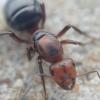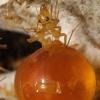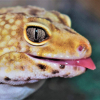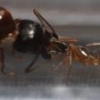So, I have 5 founding Prenolepis imparis. Four of the setups only have one queen. The fifth has 4 queens, one of which is an unmated alate. All the one queen setups have pupae now, some are even darkening already. However, the polygynous colony is having trouble. They easily have the most brood, around a hundred or so eggs. However, they have not developed over the past month or two. Not once has a single larvae appeared in their setup, and the eggs The queens are all acting healthy. They are being kept in the same conditions as the others.
Reasons I can think of and possible solutions:
- The alate. The presence of the alate might be hindering the development of the brood in some way (not sure how though). Solution: remove the alate from the setup.
- Polygyny. I know this one seems silly since these are highly polygynous ants. I'm just trying to see what the differences between this setup and the other setup are. Maybe, possibly, the presence of multiple queens is stopping development (again, not sure how). Solution: separate all queens, give each a portion of the brood. Once workers arrive, fuse colonies back together.
Please let me know which one you think it is or if you have a different reason. Any help would be much appreciated!
























